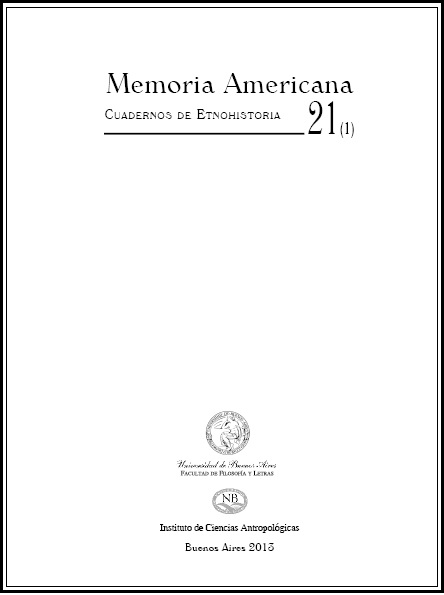Resistant practices, avoidance, and social reproduction in an adverse historical context. Looking at the indigenous from Córdoba (Argentina) in early colonial times
Abstract
The research is carried out within a historical-archaeological framework, conceived as the study of the worldwide modernization process after the European expansion. The archaeological site Alero Tala Huasi,occupied since pre-Hispanic times, is analyzed. The continuities and changes in its occupation during early colonial times -late 16th and early 17th centuries- are taken into account. The temporal persistence ofcertain economical, technological and ritual practices of pre-Hispanic roots and the selective incorporation of European elements, like the consumed livestock, are interpreted as a kind of resistance to colonialdomination and an effort to maintain the social integration. The relevance of historical archaeology to study the social processes beyond the written sources is emphasized, since it leads to the understandingof daily life practices and the agency of collective groups not registered by Colonial society’s official discourse.Downloads
References
Assadourian, Carlos 1983. El Sistema de la Economía Colonial: El Mercado Interior, Regiones y Espacio Económico. México, Editorial Nueva Imagen.
Babot, María 2007. Organización social de la práctica de molienda: casos actuales y prehistóricos del Noroeste Argentino. En Nielsen, A., M. C. Rivolta, V. Seldes, M. Vázquez y P. Mercolli (comps.); Procesos sociales prehispánicos en el Sur Andino: la vivienda, la comunidad y el territorio: 259-290. Córdoba, Editorial Brujas.
Bárcena, J. Roberto 2004. Arqueología e historia urbana: investigaciones en la ciudad y el conurbano mendocino. Chungara 36, Suplemento Especial 1: 187-196.
Berberián, Eduardo 1984. Potrero Garay: una entidad sociocultural tardía de la región serrana de la provincia de Córdoba (Rep. Argentina). Comechingonia 4: 71-138.
Berberián, Eduardo 1987. Crónicas del Tucumán. Siglo XVI. Córdoba, Editorial Comechingonia.
Berberián, Eduardo, Diego Rivero, Sebastián Pastor, Julián Salazar, Valeria Franco Salvi, Laura López, Guillermo Heider, María Cecilia Berberián y María Sol García 2008. Arqueología histórica (colonial temprana hasta la actualidad) en el Predio de Escribanos de Córdoba. Revista Notarial 90: 331-347.
Bixio, Beatriz y Constanza González Navarro 2009. Dominación, resistencia y autonomía en el extremo sur del virreinato del Perú (siglos XVI y XVII). Diálogos 13 (2): 371-399.
Bixio, Beatriz, Eduardo Berberián y Sebastián Pastor 2010. Historia Prehispánica de Córdoba. Córdoba, Editorial Brujas.
Bronk Ramsey, Christopher 2009. Bayesian analysis of radiocarbon dates. Radiocarbon 51 (1): 337-360.
Bucher, Enrique y Jorge Abalos 1979. Fauna. En Vázquez, J., R. Miatello y M. Roqué (dirs.); Geografía Física de la Provincia de Córdoba: 369-434. Buenos Aires, Editorial Boldt.
Carrara, María 1997. Santa Fe la Vieja: primer enclave urbano en el corredor paranaense. Actas de las Jornadas de Antropología de la Cuenca del Plata 1: 135-146. Rosario, Universidad Nacional de Rosario.
Castro Olañeta, Isabel 2002. Recuperar las continuidades y transformaciones: las juntas y borracheras de los indios de Quilino y su participación en la justicia colonial. En Farberman, J. y R. Gil Montero (eds.); Los pueblos de indios del Tucumán colonial: pervivencia y desestructuración: 175-202. Quilmes, Universidad Nacional de Quilmes Ediciones.
Curbelo, María 1999. Análisis del uso del espacio en San Francisco de Borja del Yi (Departamento de Florida, Uruguay). En Zarankin, A. y F. Acuto (eds.); Sed non satiata: teoría social en la arqueología latinoamericana contemporánea: 97-116. Buenos Aires, Ediciones del Tridente.
De Certeau, Michel 1996. La Invención de lo Cotidiano. México, Editorial Universidad Iberoamericana.
Demaio, Pablo, Ulf Karlin y Mariano Medina 2002. Árboles Nativos del Centro de la Argentina. Buenos Aires, Editorial LOLA (Literature of Latin América).
Doucet, Gastón 1986. Los réditos de Quilpo. Funcionamiento de una encomienda cordobesa a fines del siglo XVI (1595-1598). Jahrbuch für Geschichte von Staat, Wirfschaft und Gesellschaft Lateinamerikas 23: 63-119.
Funari, Pedro 1996. Historical Archaeology in Brazil, Uruguay, and Argentina. World Archaeological Bulletin 7: 51-62.
Funari, Pedro 1997. Archaeology, history, and historical archaeology in South America. International Journal of Historical Archaeology 1 (3): 189-206.
Gardner, Gordon 1931. Rock-paintings of north west Córdoba. Oxford, Clarendon Press.
González Navarro, Constanza 2009. La incorporación de los indios desnaturalizados del valle Calchaquí y de la región del Chaco a la jurisdicción de Córdoba del Tucumán. Una mirada desde la visita del oidor Antonio Martines Luxan de Vargas (1692-93). Jahrbuch für Geschichte Lateinamerikas 46: 231-259.
Hicks, Dan y Mary Beaudry 2006. Introduction: the place of historical archaeology. En Hicks, D. y M. Beaudry (eds.); The Cambridge Companion to Historical Archaeology: 1-9. Cambridge, Cambridge University Press.
Johnson, Matthew 1999. Historical, archaeology, capitalism. En Leone, M. y P. Potter (eds.); Historical Archaeologies of Capitalism: 219-232. New York, Plenum Press.
McCormac, F., A. Hogg, P. Blacwell, C. Buck, T. Higham & P. Reimer 2004. SHCal04 Southern Hemisphere calibration, 0-11.0 cal kyr BP. Radiocarbon 46 (3): 1087-1092.
Medina, Matías 2010. Tecnología cerámica, subsistencia y uso del espacio en el tardío prehispánico de las Sierras de Córdoba (Argentina). Werkén 13: 305-322.
Medina, Matías, Sebastián Pastor y Diego Rivero 2007. Alcances y limitaciones de la osteometría de camélidos en contextos arqueológicos de las Sierras Centrales de Argentina. Resúmenes Ampliados del XVI Congreso Nacional de Arqueología Argentina. Número Especial de Revista Pacarina I: 467-470.
Medina, Matías, Sebastián Pastor, Eduardo Apolinaire y Lucas Turnes 2011. Late Holocene subsistence and social integration in Sierras of Córdoba (Argentina): the south-American ostrich eggshells evidence. Journal of Archaeological Science 38: 2071-2078.
Montes, Aníbal 2008. Indígenas y Conquistadores de Córdoba. Buenos Aires, Ediciones Isquitipe.
Pastor, Sebastián 1999. Forma y función de las vasijas de San Roque (Depto. Punilla, Pcia. de Córdoba). Actas del XII Congreso Nacional de Arqueología Argentina III: 511-516. La Plata, Universidad Nacional de La Plata.
Pastor, Sebastián 2007. “Juntas y cazaderos”. Las actividades grupales y la reproducción de las sociedades prehispánicas de las Sierras Centrales de Argentina. En Nielsen, A., M. C. Rivolta, V. Seldes, M. Vázquez y P. Mercolli (comps.); Procesos sociales prehispánicos en el Sur Andino: la vivienda, la comunidad y el territorio: 361-376. Córdoba, Editorial Brujas.
Pastor, Sebastián 2007-2008. Arroyo Tala Cañada 1 (valle de Salsacate). Espacio doméstico y productivo en el sector central de las Sierras de Córdoba (Argentina) durante el período prehispánico tardío (ca.1000-300 AP). Arqueología 14: 41-75.
Pastor, Sebastián 2012. Arte rupestre, paisaje y tensión social: un caso de estudio en Córdoba, Argentina. Revista Chilena de Antropología 26: 7-32.
Pastor, Sebastián y Laura López 2010. Consideraciones sobre la agricultura prehispánica en el sector central de las Sierras de Córdoba. En Korstanje, A. y M. Quesada (eds.); Arqueología de la agricultura: casos de estudio en la región andina argentina: 208-233. Tucumán, Editorial Magna.
Pastor, Sebastián y Diego Rivero 2009. El diseño y la composición de los equipamientos de caza de las comunidades formativas de las Sierras de Córdoba. Arqueología Argentina en los Inicios de un Nuevo Siglo, Publicación del XIV Congreso Nacional de Arqueología Argentina II: 275-289. Rosario, Laborde Editores.
astor, Sebastián, Matías Medina y Eduardo Berberián 2013. Poblados, casas y maizales. Arqueología del espacio residencial y productivo en las Sierras Centrales de Argentina (ca. 1100-300 AP). Revista Española de Antropología Americana 43 (1). En prensa.
Pastor, Sebastián, Matías Medina, Andrea Recalde, Laura López y Eduardo Berberián 2012. Arqueología de la región montañosa central de Argentina. Avances en el conocimiento de la historia prehispánica tardía. Relaciones de la Sociedad Argentina de Antropología XXXVII (1): 89-112.
Piana de Cuestas, Josefina 1992. Los Indígenas de Córdoba bajo el Régimen Colonial (1570-1620). Córdoba, Dirección General de Publicaciones de la Universidad Nacional de Córdoba.
Recalde, Andrea 2008-2009. Movilidad estacional y representaciones rupestres. Primeras evidencias de ocupaciones estivales vinculadas con la explotación de ambientes chaqueños en las Sierras de Córdoba. Anales de Arqueología y Etnología 63-64: 57-80.
Recalde, Andrea y Sebastián Pastor 2012. Contextos “públicos” y “privados” para la ejecución del arte rupestre en el valle de Guasapampa (Córdoba, Argentina). Latin American Antiquity 23 (3): 327-345.
Serrano, Antonio 1944. Las estatuillas de arcilla de Córdoba y su significado arqueológico. Publicaciones del Instituto de Arqueología, Lingüística y Folklore “Dr. Pablo Cabrera” VII.
Silveira, Mario 1995. Análisis de restos faunísticos en sitios históricos de la ciudad de Buenos Aires (Argentina). Historical Archaeology in Latin America 8: 105-115.
Tanodi, Aurelio, María Elsa Fajardo y Marina Dávila 1958. Libro de Mercedes de Tierras de Córdoba de 1573 a 1600. Córdoba, Instituto de Estudios Americanistas, Facultad de Filosofía y Humanidades, Universidad Nacional de Córdoba. (Serie Documental V).
Wolf, Eric 1987. Europa y la Gente Sin Historia. México, Fondo de Cultura Económica.
Zarankin, Andrés y Melisa Salerno 2008. Looking south: historical archaeology in South America. Historical Archaeology 42 (4): 38-58.
Zarankin, Andrés y María X. Senatore 1996. Reseña crítica del desarrollo de la Arqueología Histórica Colonial en Argentina. Páginas Sobre Hispanoamérica Colonial 3: 123-141.
Copyright (c) 2013 Memoria Americana. Cuadernos de Etnohistoria

This work is licensed under a Creative Commons Attribution-NonCommercial-ShareAlike 4.0 International License.
Los derechos de autor son cedidos a Memoria Americana. Cuadernos de Etnohistoria, no obstante los autores podrán recuperarlos y reproducir su trabajo en otros medios o formatos previo envío de solicitud al Comité Editorial. En tales casos, deberá citarse a Memoria Americana. Cuadernos de Etnohistoria como primera publicación del trabajo y el mismo queda bajo una licencia Creative Commons CC BY NC SA 3.0 Attribution- Non Commercial -ShareAlike 3.0, la cual provee libre acceso inmediato a sus contenidos pues se rige por el principio según el cual hacer disponible -en forma gratuita- la investigación al público fomenta un mayor intercambio de conocimiento a nivel global.
Los autores deberán remitir el siguiente formulario de cesión de derechos y compromiso de originalidad:
Cesión de derechos y compromiso de originalidad
Al Comité Editorial de Memoria Americana, Cuadernos de Etnohistoria
Por la presente declaro ser el autor del trabajo titulado (nombre del artículo), el mismo es original y propio y no ha sido publicado en ningún formato o soporte con anterioridad.
En caso de ser aceptado para su publicación en Memoria Americana. Cuadernos de Etnohistoria (número/año) cedo los derechos editoriales que me corresponden por el aludido artículo para su publicación en todos los formatos que posea la mencionada revista.
Si quisiera publicar este artículo a través de otro editor o en otro lugar me comprometo a solicitar el correspondiente permiso por escrito al Comité Editorial de Memoria Americana. Cuadernos de Etnohistoria. De ser afirmativa la respuesta del Comité Editorial me comprometo a lo siguiente:
- especificar lugar, editorial y fecha de la primera publicación del artículo en la nueva publicación
- realizar esta republicación sólo luego de transcurridos un año calendario desde la fecha de la presente nota de cesión de derechos
FIRMA
Aclaración











